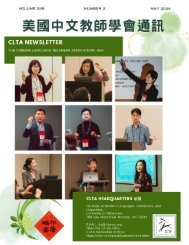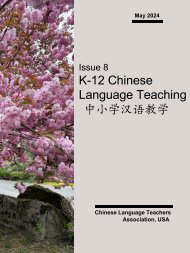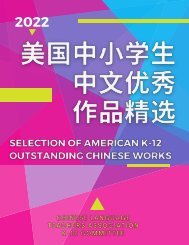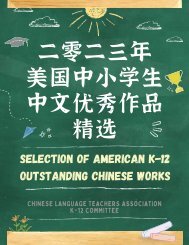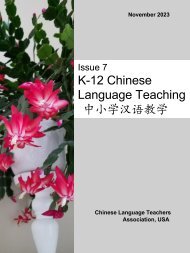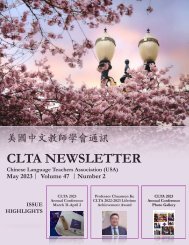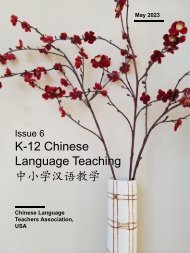CLTA newsletter Jan. 2020
Create successful ePaper yourself
Turn your PDF publications into a flip-book with our unique Google optimized e-Paper software.
<strong>CLTA</strong> NEWSLETTER <strong>Jan</strong>uary <strong>2020</strong><br />
Xiao-Desai, Yang. The effects of online writing on heritage language anxiety – a Bayesian<br />
analysis. In Li, S. & Yuan, F. (Eds.) Classroom-Based Research on Chinese as a second<br />
language (pp.128-151). New York: Routledge<br />
This study presents a Bayesian analysis of the effects of blogging on heritage writing anxiety.<br />
Results from both within and between-subject experiments corroboratively showed that online<br />
writing can lower heritage learners’ writing anxiety. However, it had on effect on learners’<br />
cognitive anxiety, one of the sub-dimensions of writing anxiety.<br />
Zhang, H. (2019). Teaching Chinese tones. In Chris Shei, Monica E. McLellan Zikpi, and Der-lin Chao<br />
(Eds). The Routledge Handbook of Chinese Language Teaching, p.166-179. Abingdon and New York:<br />
Routledge.<br />
This paper discusses teaching Chinese lexical tones, a prominent linguistic feature of the Chinese sound<br />
system, to adult learners. The chapter includes three sections. The first briefly introduces the linguistic<br />
properties of Chinese lexical tones. Focusing on the most difficult Tone 3, the second section reviews<br />
research findings on second language acquisition of Chinese tones in order to shed light on tone<br />
teaching. In order to facilitate effective tone teaching and learning, the third section offers pedagogical<br />
suggestions and three sets of sample tone training materials for instructors to help learners establish the<br />
phonological representation of Chinese lexical tones and develop motor skills for tone implementation.<br />
Zhang, H. (2019). The positional effects of contour tones in second language Chinese. In Zhang, H-M.<br />
and Qian, Youyong (ed.) Prosodic Studies: Challenges and Prospects. Routledge.<br />
ABSTRACT: This study investigates the errors made by 60 English, Japanese, and Korean speaking<br />
learners of Chinese when producing the two contour lexical tones T2 (rising tone) and T4 (falling tone)<br />
in disyllabic words. It finds that T2 is produced at a greater rate of accuracy in word-initial positions,<br />
while T4 is produced at a greater rate of accuracy in word-final positions. Two inter-tonal effects shared<br />
across the three groups of speakers were also observed:1) the accuracy rate of T2 is always greater<br />
when it is followed by tones with low onsets than when it is followed by tones with high onsets, and 2)<br />
the accuracy rate of T4 is always greater when it is followed by low tones than when it is followed by<br />
other tones. The study presents evidence suggesting that second language tones are partially constrained by anticipatory<br />
dissimilation.<br />
Xu, HY., Li, Y., & Li, YJ. (2019) Using online applications to improve tone perception among L2<br />
learners of Chinese. Journal of Technology and Chinese Language Teaching. Volume 10, 26-56<br />
This study investigated the effectiveness of an online application in helping beginning-level Chinese<br />
learners improve their perception of the tones in Mandarin Chinese. Two groups-one experimental and<br />
one traditional-of beginning Chinese learners from two universities in the Midwest participated in this<br />
study. The experimental group (n=20) used the online application to practice tones for four 15-minute<br />
sessions in class. The traditional group (n=11) participated in traditional instructor-led practice in class<br />
in lieu of the online practice. Both groups completed a pre-test, an immediately administered post-test,<br />
and a delayed post-test designed to assess their perception of the tones of monosyllabic and disyllabic<br />
words. No statistically significant difference has been found between the two groups in their tone perception performance in<br />
the post-test and in the delayed post-test. However, the experimental group showed a positive trend in improving their<br />
perception on those tones which posed more difficulty than others. Based on the findings, it is proposed that the use of<br />
online tone practice is worthwhile in a Chinese language class, but might fit better into the curriculum as external<br />
assignments.<br />
10




